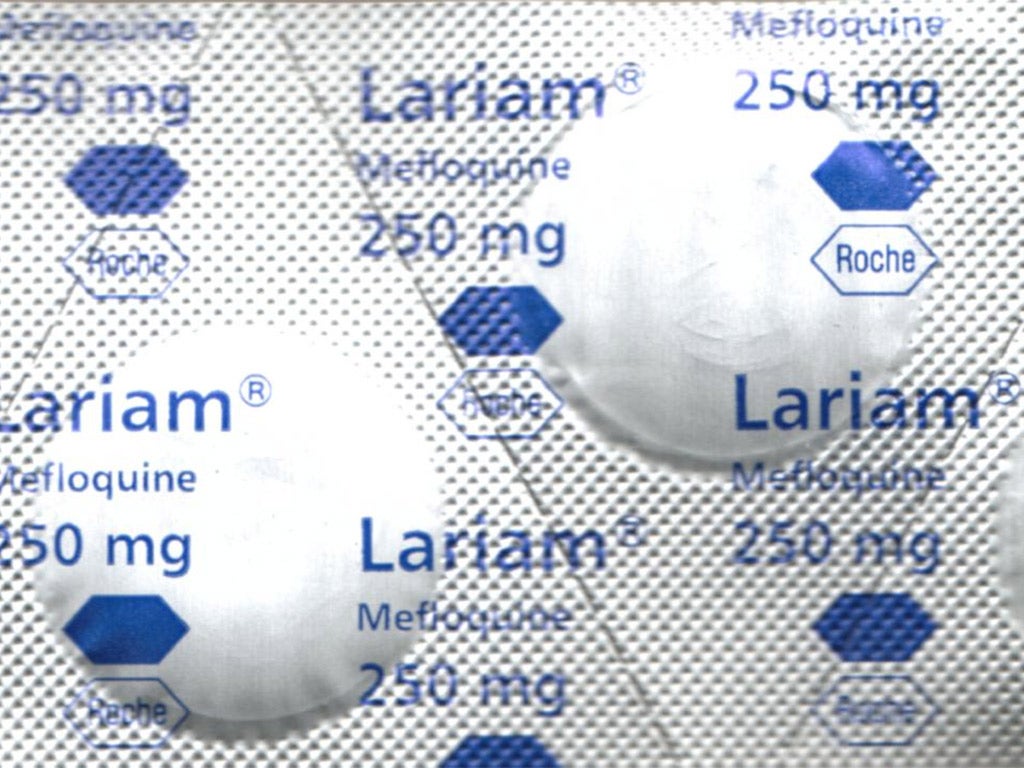Lariam: Medical experts condemn MoD for giving soldiers anti-malarial drug with psychiatric side effects
The Commons Defence Select Committee recently announced an inquiry into the MoD’s use of the drug

Your support helps us to tell the story
From reproductive rights to climate change to Big Tech, The Independent is on the ground when the story is developing. Whether it's investigating the financials of Elon Musk's pro-Trump PAC or producing our latest documentary, 'The A Word', which shines a light on the American women fighting for reproductive rights, we know how important it is to parse out the facts from the messaging.
At such a critical moment in US history, we need reporters on the ground. Your donation allows us to keep sending journalists to speak to both sides of the story.
The Independent is trusted by Americans across the entire political spectrum. And unlike many other quality news outlets, we choose not to lock Americans out of our reporting and analysis with paywalls. We believe quality journalism should be available to everyone, paid for by those who can afford it.
Your support makes all the difference.British and American medical experts have condemned the Ministry of Defence (MoD) for giving soldiers an anti-malarial drug with dozens of psychiatric side effects including psychotic behaviour, hallucinations, and suicidal thoughts.
In response to growing concern over the dangers of Lariam, prompted by a series of reports in The Independent, the Commons Defence Select Committee recently announced an inquiry into the MoD’s use of the drug.
And during an evidence session held by the committee on 8 December, a former senior army officer and malaria expert told MPs that the MoD’s position on Lariam (also known as mefloquine) is “irrational, illogical and unethical.”
Lt Colonel Ashley Croft, a doctor who served for more than 25 years in the Royal Army Medical Corps, added: “Mefloquine is the least safe of the available antimalarials currently used.” During his time in the military he raised his concerns repeatedly but the response was a “mixture of incomprehension, indifference and sometimes hostility.”
More than a thousand British service personnel have needed psychiatric treatment since 2007 after taking Lariam.

Yet superior alternatives have been available for a number of years. Dr Franz B. Humer, then chairman of Roche, the drug’s manufacturers, told the company’s annual general meeting in 2007: “More effective antimalarials with better side-effect profiles were now available, and these were generally used.”
Other antimalarials which do not have the same side effects are more expensive, with Lariam around half the cost of Doxycycline and a third of the cost of Malarone.
There are 27 neuro-psychiatric side effects linked with Lariam, according to Dr Croft. He was involved in studies into the effects of the drug in soldiers deployed to Kenya, some 20 years ago. In one study, around one in three soldiers reported severe side effects. And during another study, one soldier became psychotic and had to be flown back to Britain, while another went on to commit suicide, he told MPs.
Lariam is either banned or treated as a drug of last resort by military forces in Canada, Denmark, France, Germany, the Netherlands, Norway, and the US.
Dr Remington Nevin, a former US Army doctor and expert on the psychiatric effects of Lariam, told MPs: “Lariam is not the most effective drug [against malaria], there is no area of the world where it is the preferred drug.” The side effects can be confused with those of post-traumatic stress syndrome and the drug is strongly associated with acts of violence, warned Dr Nevin, who is based at the Johns Hopkins Bloomberg School of Public Health.
Due to the risk of side effects, particularly with people who have a history of mental health problems, the drug should only be given after an individual risk assessment by a medical professional, according to Roche.
But Dr Nevin told MPs of the difficulties this presents in practice, citing a US study in which one in seven soldiers who should not have been prescribed Lariam were given it. Many service personnel will “mask or not fully disclose a mental illness for fear of stigma,” he told the committee.
And Lt Colonel Andrew Marriott, who served for more than 30 years in the army, told the committee: “The anecdotal evidence is that the drug, certainly until at least two years ago, was routinely handed out by people such as sergeant majors who weren’t medically qualified.”

The retired officer recalled being on deployment in Sierra Leone in 2003, when around half the soldiers threw away their Lariam because they preferred the risk of malaria to the side effects of the drug.
He accused the MoD of “institutional incompetence” in failing to address the issue and demanded that it take action because “soldiers’ lives are at risk.”
In a statement, an MoD spokesperson said: “No anti-malarial treatments are without associated side effects and it is crucial we protect our personnel from this potentially fatal disease upon deployment to affected areas.” They added: “Mefloquine is not generally a first choice anti-malarial, but it is prescribed to some personnel when deployed in certain parts of the world or because of their medical history.”
Join our commenting forum
Join thought-provoking conversations, follow other Independent readers and see their replies
Comments